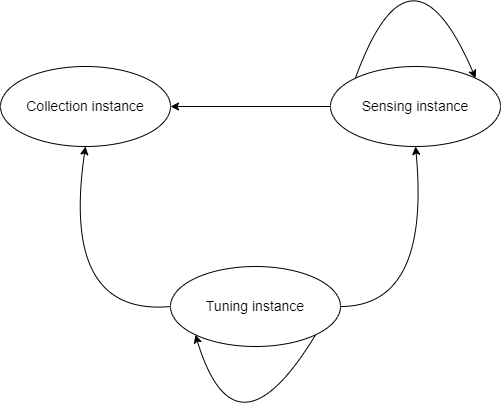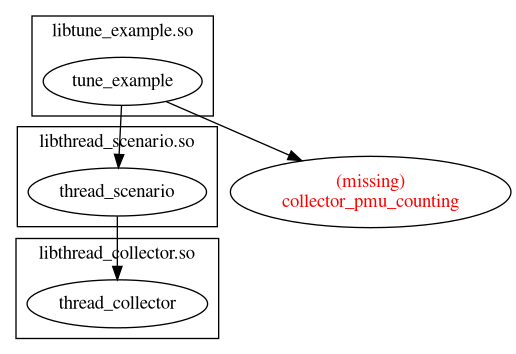oeAware User Guide
Introduction
oeAware is a framework for implementing low-load collection, sensing, and tuning on openEuler. It aims to intelligently enable optimization features after dynamically detecting system behaviors. Traditional optimization features run independently and are statically enabled or disabled. oeAware divides optimization into three layers: collection, sensing, and tuning. Each layer is associated through subscription and is developed as plugins.
Plugin Description
Plugin definition: Each plugin corresponds to an .so file. Plugins are classified into collection plugins, sensing plugins, and tuning plugins.
Instance definition: The scheduling unit in the service is instance. A plugin contains multiple instances. For example, a collection plugin includes multiple collection items, and each collection item is an instance.
Dependencies Between Instances
Before running an instance, ensure that the dependency between the instances is met.
A collection instance does not depend on any other instance.
A sensing instance depends on a collection instance and other sensing instances.
A tuning instance depends on a collection instance, sensing instance, and other tuning instances.
Installation
Configure the openEuler Yum repository and run the yum commands to install oeAware. on openEuler 22.03 LTS SP4, oeAware has been installed by default.
yum install oeAware-managerService Startup
Run the systemd command to start the service.
systemctl start oeawareSkip this step
Configuration file path: /etc/oeAware/config.yaml
log_path: /var/log/oeAware # Log storage path
log_level: 1 # Log level. 1: DUBUG; 2: INFO; 3: WARN; 4: ERROR.
enable_list: # Plugins are enabled by default.
- name: libtest.so # Configure the plugin and enable all instances of the plugin.
- name: libtest1.so # Configure the plugin and enable the specified plugin instances.
instances:
- instance1
- instance2
...
...
plugin_list: # Downloaded packages are supported.
- name: test #The name must be unique. If the name is repeated, the first occurrence is used.
description: hello world
url: https://atomgit.com/openeuler/oeAware-manager/blob/master/README.md #url must not be empty.
...After modifying the configuration file, run the following commands to restart the service:
systemctl daemon-reload
systemctl restart oeawareUsage
Start the oeaware service. Then, manage plugins and instances using the oeawarectl command, which supports loading, unloading, and querying plugins, along with enabling, disabling, and querying instances.
Plugin Loading
By default, the service loads the plugins in the plugin storage paths.
Collection plugin path: /usr/lib64/oeAware-plugin/collector
Sensing plugin path: /usr/lib64/oeAware-plugin/scenario
Tuning plugin path: /usr/lib64/oeAware-plugin/tune
You can also manually load the plugins.
oeawarectl -l | --load <plugin name> -t | --type <plugin type> # plugin type can be collector, scenario, or tuneExample
[root@localhost ~]# oeawarectl -l libthread_collect.so -t collector
Plugin loaded successfully.If the operation fails, an error description is returned.
Plugin Unloading
oeawarectl -r <plugin name> | --remove <plugin name>Example
[root@localhost ~]# oeawarectl -r libthread_collect.so
Plugin remove successfully.If the operation fails, an error description is returned.
Plugin Query
Querying Plugin Status
oeawarectl -q # Query all loaded plugins.
oeawarectl --query <plugin name> # Query a specified plugin.Example
[root@localhost ~]# oeawarectl -q
Show plugins and instances status.
------------------------------------------------------------
libthread_collector.so
thread_collector(available, close) # Plugin instance and status
libpmu.so
pmu_cycles_sampling(available, close)
pmu_cycles_counting(available, close)
pmu_uncore_counting(available, close)
pmu_spe_sampling(available, close)
libthread_tune.so
thread_tune(available, close)
libthread_scenario.so
thread_scenario(available, close)
------------------------------------------------------------
format:
[plugin]
[instance]([dependency status], [running status])
dependency status: available means satisfying dependency, otherwise unavailable.
running status: running means that instance is running, otherwise close.If the operation fails, an error description is returned.
Querying Plugin Dependencies
oeawarectl -Q # Query the dependency graph of loaded instances.
oeawarectl --query-dep= <plugin instance> # Query the dependency graph of a specified instance.A dep.png file will be generated in the current directory to display the dependencies.
Example
Relationship diagram when dependencies are met
Relationship diagram when dependencies are not met
If the operation fails, an error description is returned.
Enabling Plugins
Enabling a Plugin Instance
oeawarectl -e | --enable <plugin instance>If the operation fails, an error description is returned.
Disabling a Plugin Instance
oeawarectl -d | --disable <plugin instance>If the operation fails, an error description is returned.
Downloading and Installing Plugins
Use the --list command to query the RPM packages that can be downloaded and installed plugins.
oeawarectl --listThe query result is as follows:
Supported Packages: # Downloadable packages
[name1] # plugin_list configured in config
[name2]
...
Installed Plugins: # Installed plugins
[name1]
[name2]
...Use the --install command to download and install the RPM package.
oeawarectl -i | --install <RPM package name > # Name of a package queried using --list (package in Supported Packages)If the operation fails, an error description is returned.
Help
Use the --help command for help information.
usage: oeawarectl [options]...
options
-l|--load [plugin] load plugin and need plugin type.
-t|--type [plugin_type] assign plugin type. there are three types:
collector: collection plugin.
scenario: awareness plugin.
tune: tune plugin.
-r|--remove [plugin] remove plugin from system.
-e|--enable [instance] enable the plugin instance.
-d|--disable [instance] disable the plugin instance.
-q query all plugins information.
--query [plugin] query the plugin information.
-Q query all instances dependencies.
--query-dep [instance] query the instance dependency.
--list the list of supported plugins.
-i|--install [plugin] install plugin from the list.
--help show this help message.Plugin Development
Common Data Structures of Plugins
struct DataBuf {
int len;
void *data;
};struct DataBuf is the data buffer.
- data: specific data. data is an array. The data type can be defined as required.
- len: size of data.
struct DataRingBuf {
const char *instance_name;
int index;
uint64_t count;
struct DataBuf *buf;
int buf_len;
};struct DataRingBuf facilitates data transfer between plugins, primarily utilizing a circular buffer.
instance_name: instance of the incoming data. For instance, when data reaches a perception plugin, it distinguishes which collection item belongs to which collection plugin.
index: current data write position. For example, after each data collection, the index increments.
count: execution count of the instance, continuously accumulating.
buf: data buffer. Some collection items require multiple samplings before the perception plugin processes them, so the buf array stores these samples.
buf_len: size of the data buffer. Once the buffer is initialized, buf_len remains constant.
struct Param {
const struct DataRingBuf **ring_bufs;
int len;
};- ring_bufs: data required by the instance, sourced from other instances.
- len: length of the ring_bufs array.
Instance Interfaces
struct Interface {
const char* (*get_version)();
/* The instance name is a unique identifier in the system. */
const char* (*get_name)();
const char* (*get_description)();
/* Specifies the instance dependencies, which is used as the input information
* for instance execution.
*/
const char* (*get_dep)();
/* Instance scheduling priority. In a uniform time period, a instance with a
* lower priority is scheduled first.
*/
int (*get_priority)();
int (*get_type)();
/* Instance execution period. */
int (*get_period)();
bool (*enable)();
void (*disable)();
const struct DataRingBuf* (*get_ring_buf)();
void (*run)(const struct Param*);
};int get_instance(Interface **interface);Every plugin includes a get_instance function to provide instances to the framework.
Obtaining the version number
Interface definition
cchar* (*get_version)();Interface description
Parameter description
Return value description
The specific version number is returned. This interface is reserved.
Obtaining the instance name
Interface definition
cchar* (*get_name)();Interface description
Obtains the name of an instance. When you run the
-qcommand on the client, the instance name is displayed. In addition, you can run the--enablecommand to enable the instance.Parameter description
Return value description
The name of the instance is returned. Ensure that the instance name is unique.
Obtaining description information
Interface definition
cchar* (*get_description)();Interface description
Parameter description
Return value description
The detailed description is returned. This interface is reserved.
Obtaining the type
Interface definition
cchar* (*get_type)();Interface description
Parameter description
Return value description
The specific type information is returned. This interface is reserved.
Obtaining the sampling period
Interface definition
cint (*get_cycle)();Interface description
Obtains the sampling period. Different collection items can use different collection periods.
Parameter description
Return value description
The specific sampling period is returned. The unit is ms.
Obtaining dependencies
Interface definition
cchar* (*get_dep)();Interface description
Parameter description
Return value description
Information about the dependent instances is returned. This interface is reserved.
Enabling an instance
Interface definition
cvoid (*enable)();Interface description
Enables an instance.
Parameter description
Return value description
Disabling an instance
Interface definition
cvoid (*disable)();Interface description
Disables an instance.
Parameter description
Return value description
Obtaining the data buffer
Interface definition
cconst DataRingBuf* (*get_ring_buf)();Interface description
Obtains the buffer management pointer of the collection data (the memory is applied for by the plugin). The pointer is used by sensing plugins.
Parameter description
Return value description
The struct DataRingBuf management pointer is returned.
Executing an instance
Interface definition
cvoid (*run)(const Param*);Interface description
Runs at regular intervals according to the execution cycle.
Parameter description
Contains the data necessary for the instance to execute.
Return value description
Supported Plugins
- libpmu.so: collects PMU-related data.
- libthread_collector.so: gathers thread information within the system.
- libthread_scenario.so: monitors details of a specific thread.
- libthread_tune.so: enhances UnixBench performance.
- libsmc_tune.so: enables SMC acceleration for seamless TCP protocol performance improvements.
- libtune_numa.so: optimizes cross-NUMA node memory access to boost system performance.
Constraints
Function Constraints
By default, oeAware integrates the libkperf module for collecting Arm microarchitecture information. This module can be called by only one process at a time. If this module is called by other processes or the perf command is used, conflicts may occur.
Operation Constraints
Currently, only the root user can operate oeAware.
Notes
The user group and permission of the oeAware configuration file and plugins are strictly verified. Do not modify the permissions and user group of oeAware-related files.
Permissions:
Plugin files: 440
Client executable file: 750
Server executable file: 750
Service configuration file: 640


